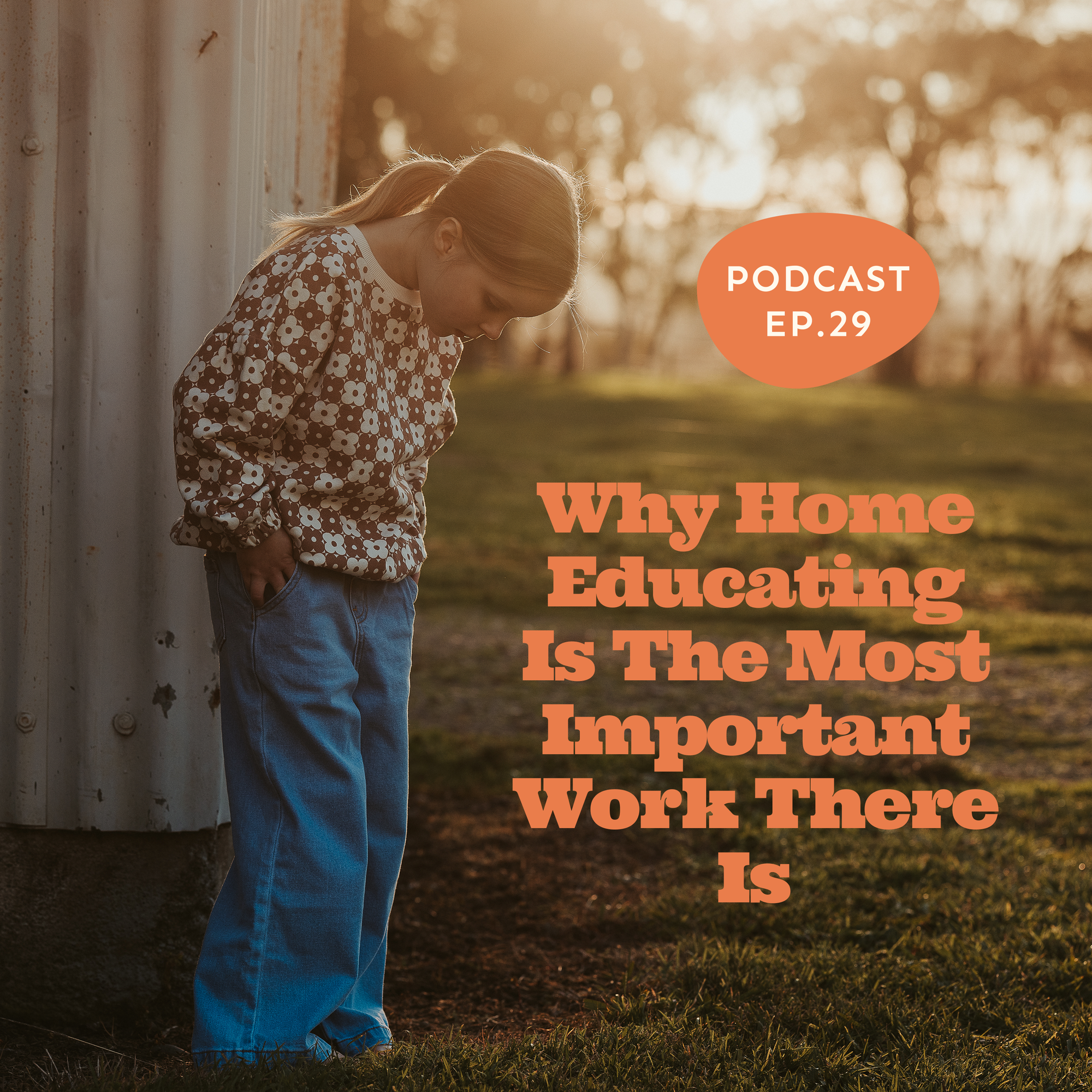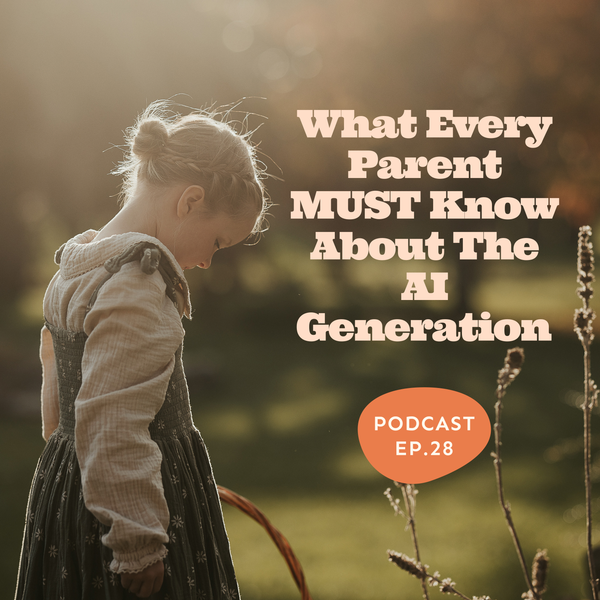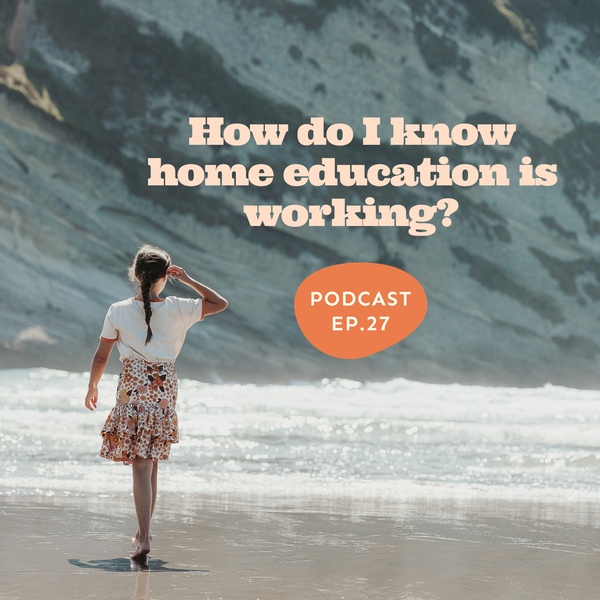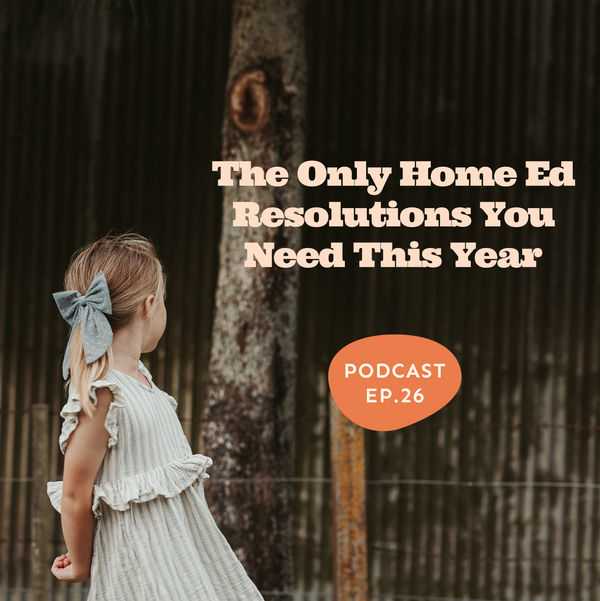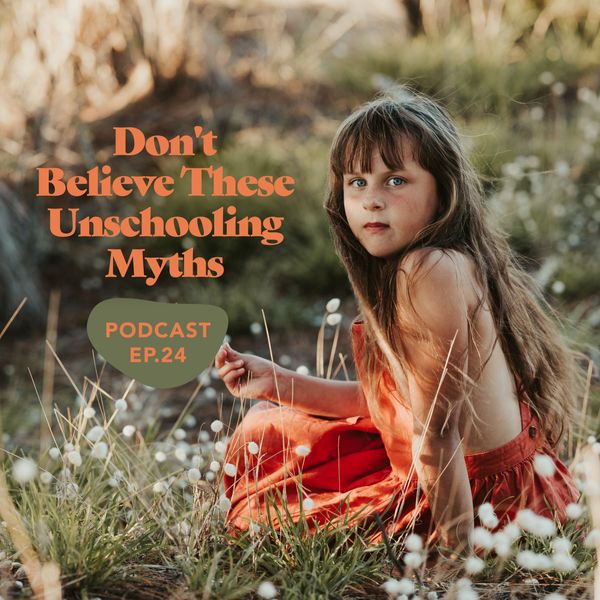I want to put something to you. If you’ve chosen to home educate your children - whatever form that takes, however structured or unstructured you are - there’s a good chance you’re not valuing yourself, or your role, nearly as much as you should.
And I say that with no judgement at all. Because I’ve done that too. As has my wife, Kate. In fact, she’s my inspiration for this episode, because as she’s worked hard on that internal messaging over the past couple of years she’s realised how little credit she’s given herself for what she’s taken on. And she would very much like to make sure that the same thing does not happen to you.
Because somehow, despite the enormity of what you’ve taken on, it doesn’t feel like a recognised role. A respected role. Not in the way the world treats work. There’s no title. Status. Career path. No salary. Just you, doing the job every day, while the people around you move through careers that are culturally validated.
Today I want to show you why I believe you’ve taken on a level of professional responsibility and weight that most people never will. I want to talk about why you probably don’t believe that right now, what affect that’s having on how you see yourself (and how you show up for your children), and how to step back and reframe your role. Your importance. Your value.
I believe that what you’re doing deserves to be recognised as a career-level responsibility. And I also believe that once you see it that way, it will change your life.
These private episodes go even deeper, backed by research, the science of how children learn and grow, and more than a decade of lived home educating experience. Each one is designed to help you rethink, reframe, and recalibrate the way you're walking this path, giving you the confidence to live the version of life you want. The Collection is 56 episodes strong and counting, with over 30 hours of listening available right now.
As a subscriber, you'll also get immediate access to my self-paced course, expert-led masterclasses recordings, five downloadable guides, our school exemption documents, and more 💛
Show Notes
You'll find all my weekly episodes right here (as of today, there's over 15 hours of listening that's not available anywhere else).
To access those, you can join my complete Collection right here.
Transcript
I want to put something to you.
If you’ve chosen to home educate your children - whatever form that takes, however structured or unstructured you are, whatever version or flavour you most align with - there’s a good chance you’re not valuing yourself, or the role you’re doing, nearly as much as you could or should.
And I say that with absolutely no judgement at all. Because I’ve done that too. As has my wife, Kate. In fact, she’s my inspiration for this episode, because that internal narrative has started changing a lot for her over the past couple of years - and as she’s gone through that, she’s looked back and realised how little credit she has given herself for what she’s taken on. And she would very much like to make sure that the same thing does not happen to you.
There’s a big identity shift that happens when you choose this path. One day your child is in school, or heading towards it, and the next, you’re the one responsible for their learning. Their development. Their future.
And yet somehow, it doesn’t feel like a full role. A recognised role. A respected role. Not in the way the world treats work. There’s no title. No status. No career path. No salary. Just you, doing the job every day, while the people around you move through careers that are culturally validated. Maybe you had one of those careers. Maybe you were planning on one. Maybe you used to show up to a job every day and get paid, and patted on the back.
So when you swap all that out to just - inverted commas - “be at home with your kids” - you start to internalise the idea that what you’re doing doesn’t carry the same weight as someone with a recognised profession. It’s extremely hard not to do that, given how the world views work. And so of course, over time you start to carry yourself that way within your role.
So I want to show you something today. I want to show you why I believe you’ve taken on a level of professional responsibility and weight that most people never will. I want to talk about why you probably don’t believe that right now, what affect that’s having on how you see yourself and how you show up for your children, and how to step back and reframe your role. Your importance. Your value.
I believe that what you’re doing deserves to be recognised as a career-level responsibility.
And I also believe that once you see it that way, you’ll approach it differently.
This shift - in how you see yourself - I promise you it will change your life.
So that’s where we’re going to spend some time together today. It will take some vulnerability from both you and I as we go through this, but if you’re ready for it…I am too. So let’s do it.
1. Why you probably don’t see this as a real role
I want to start by saying that if you see, and have internalised, your home educating role as something lesser…it is not your fault. And it’s also extremely common.
Because the world around you doesn’t treat what you’re doing as real work. It treats it like a lifestyle choice. A parenting preference. Something you’ve decided to try because you like the idea of being more involved with your kids.
And when the culture around you doesn’t recognise something as serious and real and significant, it’s very hard to properly take it on. If you’re like us, that will probably even come through sometimes in how you talk about it with other people.
Depending on who it is, and how you think they might respond, when you’re talking job and career stuff you say things like “Oh, I’m just at home with the kids for a while right now,” or “We’re doing a bit of homeschooling this year, we’ll see how it goes.” You try to sound casual. Open. Not too intense about.
Because you know if you do sound too serious, people might look at you sideways. You know they might think you’ve gone a bit too all-in on parenting to be taking what you’re doing so seriously.
And after enough of those moments, you start downplaying it without even realising.
You become hyper-aware of how people react when you mention home education - the polite nods, the change of subject, the sometimes awkward silence. You notice that most people don’t really asks follow-up questions about what you’re building with your kids the way they would if you were in a conventional job.
You sit in groups of adults talking about work, about projects and deadlines and promotions - and even though you know, deep down, that your days are full, that your mind is stretched, that the emotional and logistical weight you carry is huge… you still feel less.
You know you don’t get to switch off at 5pm. You don’t get to close your laptop and leave your work behind. You carry it 24/7, practically, emotionally, and biologically - right down into your nervous system.
And yet, in those conversations about jobs, and professions, and careers, you feel less.
Like you need to defend your choice. Like what you’re doing is smaller. Softer. Something that’s easy to do, easy to dismiss. Something that’s less important.
We’ll get to how far that is from the truth. And we’ll get to how I believe what you’re actually doing is one of the most demanding, complex, emotionally loaded roles an adult can hold.
But the place we need to start is - the world doesn’t know what to do with this.
Because in most people’s minds - whether they explicitly say it or not - adult value is measured by economic contribution.
You are validated as a person when you’re seen to be working. When you have a job title. When you’re producing, earning, building something measurable. That’s what counts. That’s what gets respect in this world.
And when you step outside of that - even for something as serious and deliberate and significant and important as raising and educating and developing your children - the validation dries up. The social feedback loop closes.
You don’t get a title.
You don’t get a contract.
You don’t get that nice moment where someone hands you a job description and says,
“Congratulations. You’ve taken on the long-term development of a human being. Here’s your support team, your professional development budget, your measurable outcomes, your performance review dates, annnnnd your salary.”
You get none of that.
You just start doing it.
And then, bam - you’re left trying to prove that what you’re doing still counts. Still has value. To both the world around you, but more importantly - far more importantly - to yourself.
Because when the world doesn’t respect your role, when you’re surrounded by people whose work fits into neat, nameable boxes, it’s very easy to convince yourself that this isn’t real work.
That you’re not really contributing to society like others are.
And when you don’t see your role clearly - when you keep treating it like something secondary, something less important - it seeps into everything. You doubt yourself more. You second-guess your instincts. You treat the hard days like a sign you’re not doing enough, rather than what they really are: the natural weight and struggle and ebb and flow of any real meaningful work.
So I want to bubble all of that up - all of those feelings, and perspectives, and just have you sit with it for a moment.
If you’ve ever felt like you’re just kind of doing life, while the people around you are all doing something bigger, more legitimate, I want to assure that that’s not a reflection of the work you’re doing. It’s not a reflection of how unimportant your role is.
It’s just a reflection of the world you happen to be doing that work in.
And it’s time to rebuild the way you see it.
2. What this role actually is
The next thing I want to do here is actually name what it is you’ve taken on.
Because I think a lot of us live under this impression that we’re “just” facilitating learning at home. Or helping our kids avoid the stress of school because it wasn’t working very well for them, or supporting their curiosity in a more flexible way because we’ve decided that’s really important. And yes - you probably are doing some or all of those things, and other things like them.
But that’s not what this role is.
This is not just a parenting choice. It’s not a stopgap. It’s not a sabbatical from “real work.”
It’s far more serious and important than all that.
Because what you’ve actually done is taken on full responsibility for your child’s development - emotional, cognitive, social, intellectual. Not just the learning part. All of it.
That would be a big job even with a team around you. But you’re almost certainly doing this without a team. You’re not walking into a school each day and leading one part of one subject with one age group.
You are holding the whole thing.
All day. Every day.
No handovers. No time off. No specialisation. No professional distance.
You’re adapting moment to moment to the needs of an individually developing human being, and you’re doing that as the person they’re most emotionally attached to. Which makes it more powerful and rewarding, sure, and that’s great - but also way more complex.
Because your child doesn’t filter with you the way they would with a teacher. Do they? They don’t compartmentalise. They don’t keep a lid on things until the bell rings. They bring everything to you, all the time - their joy, their frustration, their resistance, their breakthroughs, their mess, their meltdowns. They test their sense of safety with you. And they build their sense of self around the way you respond to them.
And you are doing all this with your home as the central base, in the middle of life, alongside all the other things you’re probably at least partly responsible for.
Meals, cleaning, relationships, finances, your own identity, your own energy levels, your own nervous system - everything is happening inside the same space, with no hard edges and no real definition between the roles you’re holding.
And within all of that, you are still observing. Still guiding. Still adjusting.
Still planning for tomorrow, and the week after that, and the season beyond that.
Still noticing when something’s off.
Still scaffolding new skills, and soothing big emotions, and trying to get to the bottom of why your child is withdrawing, or struggling, or suddenly fired up and excited about something new.
You’re doing work that touches emotional development, social growth, academic readiness, identity formation, and more.
You are shaping a whole human being. In real time. With no manual.
It’s serious work.
It is the work of a coach, a mentor, a guide, a curriculum designer, a therapist, a program coordinator, a behaviour specialist, a life skills teacher, a mediator, a motivational speaker, a learning strategist - and also the cleaner, the snack supplier, the emotional sponge, the logistics manager, the physical co-regulator, and the reset button for every meltdown and mess - all rolled into one. All those things, and probably dozens of other things I’m just not thinking about right now.
And you’re doing all that while being emotionally tied to, and emotionally invested in, the outcomes. Because these aren’t students you’ll say goodbye to at the end of the year. They are your children. The stakes are lifelong.
Now, to be clear, I’m not saying any of this to overwhelm you.
I’m saying it because you deserve to have it named.
If you’re someone who’s ever worried about “losing” your professional identity through this, I want you to really hear this:
You’ve been building, and are continuing to build, a skill set that most workplaces would kill for.
Strategic planning? You’re doing that every week as you design and adjust the rhythm of your days, weighing needs, capacity, seasonality, personal goals.
Conflict resolution? Emotional intelligence? You’re on the front lines of that work every single day, helping humans work through relationships, manage their emotions, and build empathy.
Continuous improvement? Yep - you’re observing, reflecting, adjusting, and rebuilding - over and over again - to help your family function and grow.
Stakeholder management? Please. You’re working with developing humans of wildly different ages, temperaments, and needs, and you somehow keeping them moving through the same shared life.
If this work sat inside a business, it would be called project management. And HR leadership. And coaching. And team development. And systems design. And all sorts of other fancy titles.
So much of the pressure you feel? So much of that background hum of “why am I so tired, why do I feel so stretched, why do I feel like I’m just not enough?” — is because you’re doing a level of emotional and developmental labour that doesn’t fit inside any normal job description. It spans across literally dozens.
And just to give that a little extra context - economists who study unpaid domestic and caregiving work regularly place its value somewhere between 100 and 180 thousand US dollars a year, depending on how it’s calculated.
If you paid professionals for the tutoring, the mentoring, the therapy, the logistics coordination, the project management, the emotional support, the meal prep and clean-up, the crisis response — the work you’re already doing — you’d be writing cheques worth multiple six figures. Every year.
And if this were a formal job? You’d also have a team around you. You’d have HR policies. You’d have a paid sabbatical allowance. You’d have professional development days and an L&D budget. You’d probably have someone checking in on your wellbeing.
There is no world in which this work should ever be called soft, or casual, or light, or minor, or lesser.
This is big work.
And the fact that it doesn’t come with a name badge or a tax code or a professional title or a salary does not change that.
You might not have set out to build a career inside this thing.
But that is what it is.
And that’s because you’ve taken it on with the kind of intention, effort, and daily responsibility that defines a career - even if the world doesn’t recognise it as one.
You are doing the kind of work that shapes the future.
Not just in the abstract.
In the way your child learns to handle discomfort… to follow their curiosity… to process emotion…
In the way they’ll eventually carry themselves in relationships. The way they’ll respond to challenges. The impact they will make on the world around them. So much of that is being built right now, in the environment you are creating, and fostering.
One day, that small child will be a fully grown adult moving through the world. And they’ll carry many, many pieces of this season with them. They will be deeply, profoundly shaped by your work.
And whether or not anyone ever claps you into a meeting room to acknowledge that, whether or not there’s a LinkedIn post or a promotion path or a payslip to prove it - none of that changes what you’re actually doing.
So, no, you may not have a formal piece piece of paper with a contract and a fancy sounding job description.
But you, my friend, have taken on one of the most difficult and rewarding careers there are.
QUICK BREAK
If this episode is resonating, and you’re finding this podcast helpful, I release one like it every single week inside my Complete Life Without School Collection. These are highly focused, research-backed episodes that speak directly to the questions and challenges home educating families face. They’re designed to help you build an approach that actually works for your unique family.
It’s a paid subscription, because that’s what helps me keep doing this work — supporting families around the world through something grounded, well-researched, thoughtful, and genuinely useful every week. But it’s low cost, and it’s easy to cancel any time, so if this feels like the kind of support you could use every week - jump over to starkravingdadblog.com and make sure you’re signed up to get my emails. That’s where I send them out every week, and that’s where you’ll be able to join the complete collection. I’ll also link directly to it in the show notes for this episode, right there on my website.
I had an email from Jessica recently about the Collection, that really made me smile, so I want to share that quickly. She said:
“Thanks for all your content, it is SO helpful to me. You seem to strike that perfect balance between freedom and structure. I find that so difficult myself, so everything you share is just such a goldmine. I recently became a paying subscriber and, well, it's like running around in a candy store, stuffing my face.“
That is so, so good. Thanks Jessica, I’m glad you’re enjoying yourself in there. Right, let’s get back to this episode shall we?
/END BREAK
3. What happens when you start seeing it that way
When you actually take a breath and begin to see this role for what it really is - not just a phase, or a lifestyle choice, or something you’re squeezing in around the edges of “real life,” but a genuine, meaningful, career-level responsibility - things shift.
You start to move through your days a little differently. You stop apologising for the choices you’ve made. You stop explaining them quite so much. You stop talking about this life like it’s something temporary. Like it’s something you’ll return from, back to the “real world,” once you’ve maybe scratched the itch.
Because you begin to realise - this is the real world. This is as real as it gets.
You begin to realise that the work you’re doing is not a detour from being a productive, capable, contributing adult…it is the ultimate contribution. It is the place where your skills, your instincts, your energy, and your presence are being put to use in the most direct, human way possible.
You are raising a human being. That is work - strategic, responsive, exhausting, courageous work.
You are doing the job of professionals across multiple industries - education, counselling, logistics, behaviour support, personal development - often all before lunch. And then again in the afternoon. And then again at bedtime.
And you don’t get to clock out.
So when you finally see your role for what it actually is, it changes you.
It changes how you speak about your life.
It changes how you plan and use your time.
It changes how you move through the tricky bits.
You become more patient with yourself - because you understand the responsibility you’re carrying.
You become more decisive - because you know your values, and you’re living according to them.
You become less shaken by judgment - because you’ve done the work of seeing your role clearly, and you value it to your core.
It doesn’t mean you never question yourself, of course, I can promise you that from my own personal experience.
But you are no longer led by those questions.
You don’t spend your days wondering whether you’re wasting your potential, or letting your qualifications gather dust, or falling behind while everyone else moves forward.
Because you know: this is forward.
This is growth.
This is contribution.
And when the going gets tough or challenging or hard, as it often does in this lifestyle, instead of wondering what’s wrong with me, or why is this so hard I should be better at this, you begin to understand:
Of course it’s hard.
This is high-responsibility work.
When you internalise all of this, it helps you stand up a little straighter in career conversations that used to make you feel awkward. You don’t rush to explain your choice, or try to frame it in a way that makes it easier to swallow for someone who still believes school is the gold standard childhood. You don’t find yourself fumbling to justify the kind of life you’re building, or shrinking a little when someone talks about their latest promotion.
Because you’re no longer measuring yourself by someone else’s definition of contribution.
You’re no longer waiting for the world to validate what you already know.
You’re building something significant inside your home and family - something complex, something demanding, something deeply human - and you are holding that role with the kind of care and commitment that deserves to be recognised.
Not just by other people. That would be nice.
But by you.
And when that recognition properly settles in, it just feels different. Not in the way that everyone suddenly understands, or the world starts handing out awards for what you do. That probably won’t happen, I’m afraid. Maybe one day, let’s keep working on it.
But because something has shifted internally. Something has changed in your identity.
You know what you’re carrying. And you know what it costs - physically, emotionally, relationally - to do this day in and day out with intention and effort.
And when you know that, when you’ve seen it clearly and started owning it fully, the noise around you dulls down. It’s not that the questions or assumptions disappear. But they do lose their grip.
You feel less like you need to prove the legitimacy of your days.
Because now, you’re seeing this role for what it is. And you’re seeing yourself for who you are.
Close
So now that we’ve said all this out loud - now that we’ve taken the time to name what this role actually is - I want to leave you with this:
You haven’t just stepped away from the school system. You’ve stepped into something so much bigger than most people will ever understand.
You’ve taken on a level of responsibility that doesn’t come with any of the usual markers - no title, no pay grade, no professional roadmap - but make no mistake: it is real, serious, life-shaping work.
And it is shaping you, too.
Because the longer you walk this path - the more you stretch to meet your child’s needs, and your family’s needs, the more you stay steady through the hard days, the more you learn to trust your instincts - the more you become someone new.
Someone who sees things differently. Someone who is building something real and genuine inside your family that will impact the world in a significant way.
So, please, don’t let the absence of outside validation make you question the value in what you’re doing. Or question your identity.
Don’t let the job title you used to have - or the one you thought you might have one day - or the one someone you know has - don’t let any of that define the value of your days.
Look at what you’ve taken on.
Really look at it.
And then ask yourself:
What kind of person steps into all that, and takes it on, and grows in it, and does whatever they can to do it well? That’s a very special person.
And if your child could see it all from the outside - the effort, the steadiness, the care, and one day when they’re older they will - they’d tell you the same.
So, for now, while they’re still young, I’ll say it for them:
Thank you.
You matter. This matters. And you are doing the most important work there is.


